Iranian MP Threatens Mobilizing Proxies As Hamas-Israel War Spirals
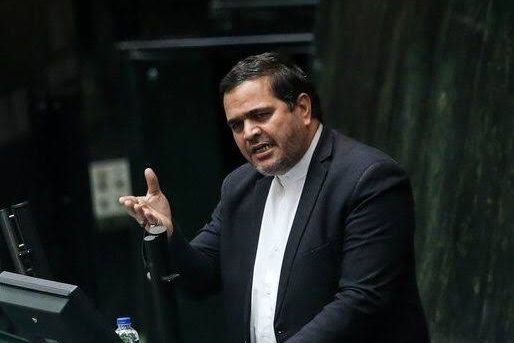
Iranian MP Ali-Asghar Annabestani has warned of the mobilization of Iran's proxies around the region should there be an Israeli ground invasion of Gaza.

Iranian MP Ali-Asghar Annabestani has warned of the mobilization of Iran's proxies around the region should there be an Israeli ground invasion of Gaza.
While he said activating those on Israel's borders with Syria and Lebanon "is conceivable", more alarmingly, he mentioned mobilizing Iranian proxy forces even beyond Israel's borders.
"Moreover, the entry from other fronts of the resistance, both in Iraq, like the Nujaba movement and the Popular Mobilization Forces, and the resistance forces in Yemen, is conceivable to enter the field and deliver an unforgettable blow to the Israelis," he said.
His statement underscores Iran's commitment to support various terror groups aligned with its interests in the Middle East and their potential involvement in the war.
Mohammad Hossein Asfari, another Iranian MP, revealed the depth of Iran's involvement in the conflict through its proxies, which it terms 'resistance forces', even though it continues to deny responsibility for Hamas' war on Israel which broke out on October 7. Iran-backed Hamas terrorists infiltrated by land, air and sea, killing hundreds of civilians including babies and families.
Asfari claimed: "We are prepared for all scenarios, and responses [to a ground invasion] have been pre-planned. If they step one meter into the Gaza borders, the resistance forces will undoubtedly execute the predefined scenarios in various parts of the world."
On Tuesday, German Chancellor Olaf Scholz joined other western nations including the US and UK in issuing a direct warning to Hezbollah and Iran not to intervene in the ongoing conflict.
"Together with our allies, we as the German government are doing everything in our power to ensure that this conflict does not escalate further," he added.
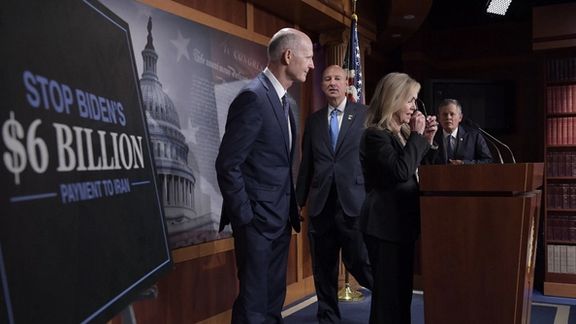
In the wake of recent Hamas attacks on Israel, more than 110 House Representatives have called for a tougher stance against the regime in Iran.
In a letter published Monday night, the lawmakers (63 Democrats and 50 Republicans) urge President Biden to hold the Islamic Republic accountable for its ongoing financial support of Hamas.
“We urge the Administration to take all necessary steps to cut off Iranian funding sources,” the letter reads. “This includes maximum enforcement of all US sanctions and taking any and all steps to end Iran’s oil trade to China, which currently brings in $150 million per day in revenue.”
This House initiative is the latest in a long line of Congressional efforts in the past few weeks, aiming to force the Biden administration to exert more pressure on Iran, restricting the regime’s access to funds, in particular.
Top Iranian officials, including the Supreme Leader Ali Khamenei, have praised Hamas for the brutal attack on Israel that killed more than 1,300 civilians. On Tuesday, Khamenei dismissed those deaths, saying that Israeli civilians have weapons and are considered combatants.
In a separate initiative Tuesday, a group of Senate Republicans demanded once more that the administration refreeze the $6 billion in Iranian oil revenue that was released as part of a deal to free five hostages from Tehran.
“We know that Iran bankrolls Hamas,” said Senator Balckburn, leading the group. “It is perplexing why this administration refuses to issue a formal decision to freeze the $6 billion. We need to ensure that not another dollar goes to Iran.”
Many US lawmakers have visibly lost patience with Biden over what they see as unwarranted leniency towards the Islamic Republic, which seems to have led to a replenishment of the regime’s coffers after a period of hardship brought about by President Trump’s ‘maximum pressure’.
Senator George Marshall, one of the more vocal members of the Senatorial group who demanded the ‘refreeze’ on Tuesday, claimed that under Biden, Iran's currency reserves have gone “from $6 billion to $60 billion” because the regime has been allowed to sell “a billion dollars’ worth of oil every week to China.”
“Iran has played Joe Biden like a cheap fiddle,” said Senator Marshal. “Joe Biden has ignored sanctions for two years now, and now he’s lifting those sanctions.”
On October 18, the UN ballistic missile sanctions will expire under the terms of the Joint Comprehensive Plan of Action (JCPOA). As things stands, President Biden will arrive in Israel on the same day that he allows UN sanctions to be lifted on Iran’s capability to purchase and supply missiles.
“This cannot be allowed to happen,” write the Representative in their letter to Biden. “We urge your Administration to work with our European allies to immediately implement snapback sanctions on Iran at the UN Security Council.”
President Biden in Israel is expected to urge Netanyahu to allow humanitarian aid for Gaza while exploring all routes that may help retrieve the American hostages taken by Hamas during their incursion into Israel.
More than 1,500 were killed in the attack, including soldiers. Neearly twice that number have been killed so far by Israeli airstrikes on Gaza. Many fear that a looming Israeli ground invasion would dramatically increase the number of casualties and bring into the war other regional actors like Hezbollah.
Hezbollah has reportedly stockpiled tens of thousands of rockets since its last war with Israel in 2006. The group has been funded by the Islamic Republic, which sees it as an strategic ally in Israel's backyard.
Critics of the Biden administration believe its reluctance to pressure Iran in the hope of a nuclear deal has emboldened not only the regime but its proxies across the region.
Those most vocal, like Senator Ted Cruz, are going beyond the usual critique and accuse the administration of letting in ‘compromised’ individuals who have then influenced foreign policy.
On Tuesday, Senator Cruz once more addressed this issue in an interview with Fox News.
“Rob Malley, Biden’s Special Envoy to Iran, appointed Iranian operatives to key positions in the US government,” he said. “Democrats have yet to allow the Senate Foreign Relations Committee to hold a hearing about this. This is disgraceful.”
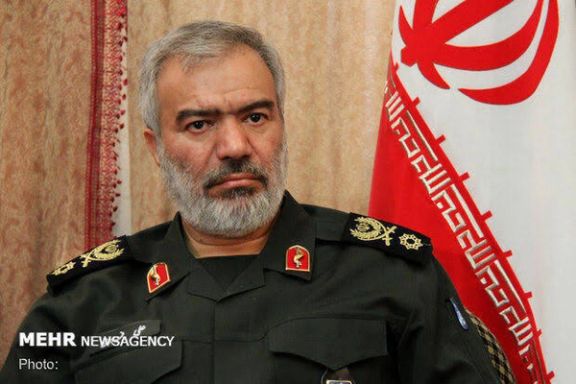
Ali Fadavi, the deputy commander-in-chief of the Islamic Revolutionary Guard Corps (IRGC), has declared “the resistance will go on until the cancerous gland [Israel] is eradicated from the world map".
He made the comments on Tuesday, echoing regime leadership statements reaffirming its support for its largest Palestinian proxy, Hamas.
Just after the Hamas invasion of Israel on October 7, Hossein Salami, the IRGC Commander, declared, "Today, the people of Palestine are pursuing and arresting Israeli soldiers without any fear, and Israel can no longer declare victory. Today signifies the end of occupation and aggression, with even the Americans unable to save them."
Michael Kurilla, the commander of the United States Central Command (CENTCOM), has traveled to Israel to meet with Israeli officials. In a statement Tuesday, CENTCOM announced that one of Kurilla's primary goals during his visit is to assess the defensive needs of the Israeli army and work to prevent the escalation of conflict in the region.
According to reports from France 24, a Russian-proposed resolution to condemn the recent hostilities in the region failed to receive sufficient support in the United Nations Security Council, with four votes in favor, four abstentions, and six votes against.
The reason for opposition by the United States and several other countries is reportedly the absence of Hamas' name in the resolution as a party responsible for the deadly attacks on Israel on October 7.
While fears of a ground invasion into Gaza continue, the Israeli Defence Forces is keeping its cards close to its chest while it continues airstrikes on the strip.
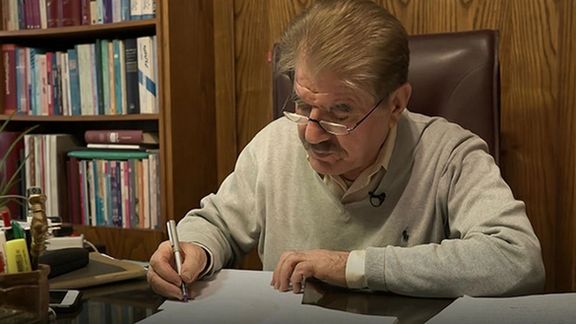
Saleh Nikbakht, the attorney representing the family of Mahsa Amini, has been sentenced to one year in prison on charges of "propaganda activities against the system".
The legal activist also received a supplementary punishment of two years prohibiting online activities. The initial court proceedings for Nikbakht took place in August, during which he faced allegations related to his media interviews, including discussions on the legal aspects of Mahsa Amini's case.
Notably, Nikbakht had voiced objections to the forensic report attributing Amini's death to a "heart attack" and an "underlying disease," advocating for a reinvestigation by a committee of independent medical professionals.
The prosecution presented nine interviews conducted by Nikbakht between 2019 and 2023 as "evidence" against him, where he discussed controversial topics such as the confrontations between security forces and Afghans.
Saleh Nikbakht's summons occurred exactly six months after the death of Mahsa Amini. The young woman, originally from Saqqez, had come to Tehran with her family to visit relatives but was arrested by the morality police on September 13 for "improper hijab."
During her first two hours in detention, she suffered severe head injuries, prompting her transfer to a hospital in Tehran. Tragically, by September 16, she was dead.
Amini's death had profound ramifications, inciting widespread protests against the Islamic Republic. The demonstrations marked one of the most significant uprisings against clerical rule in Iran in the past 43 years.
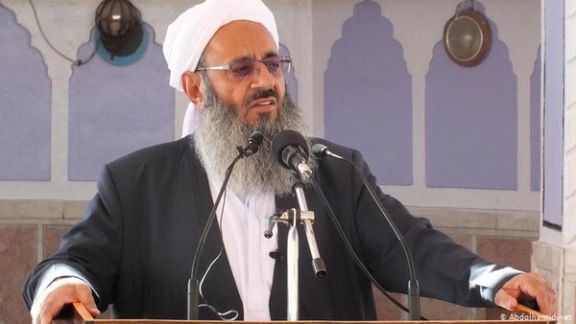
Zahedan's Friday Imam criticized the Iranian regime forces for blocking Sunni clerics' entry into the city, denouncing it as "narrow-mindedness."
In a response to the recent actions taken by security forces to prevent the entry of several prominent Sunni clerics into Zahedan, Mowlavi Abdolhamid, the outspoken cleric was quick to condemn the collective punishment.
The controversy began when security forces thwarted the journey of Mowlavi Habib ul-Rahman Mottahari, the director of the Sunni seminary of Khaf and several other notable Sunni clerics in Sistan and Baluchestan province who were attempting to travel to the provincial capital city. Security forces returned them to Khaf after inspecting their belongings.
Also, on Monday morning, security forces prevented the entry of Mowlavi Fazl ul-Rahman Kouhi, the Friday prayer leader and the director of a Sunni seminary in Sarbaz into Zahedan.
Abdolhamid, in his remarks on Monday, stressed, "Narrow-mindedness and ruling are not compatible. The ruler at the top should have a broader and more open view. They should not hinder the travels of scholars and question their destinations."
He emphasized that both the people and Sunni clerics are an integral part of the country.
The courageous cleric from the country's Muslim minority noted that "The general demand of the nation is to have freedom in the country and to avoid strictness."
Sistan and Baluchestan Province is not only one of the country's poorest regions but was among the regions that experienced the most extensive protests during the nationwide protests which began last year in the wake of Mahsa Amini's death in morality police custody. The region has seen a huge death toll in the hands of security forces and has seen thousands hospitalized after state sanctioned brutality swept the region.
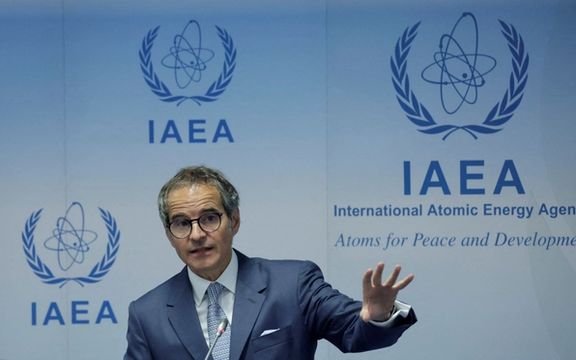
The UN nuclear watchdog warns the future of Iran's nuclear program could mirror the path taken by North Korea, characterized by secrecy and no international oversight.
Rafael Grossi, the Chief of the International Atomic Energy Agency (IAEA), stated on Monday that the world must not repeat the mistakes it made with North Korea, where IAEA inspectors were expelled in 2009, leading to the development of nuclear weapons.
The IAEA has had no access to the country since 2009 and has been monitoring its nuclear advancements from a distance, mainly through satellite imagery. While the agency maintains access to Iran's declared nuclear facilities, the recent expulsion of around one third of its inspectors by the Islamic Republic has raised major concerns.
Furthermore, the erosion of the 2015 nuclear deal between Tehran and major powers over the past five years has resulted in the removal of additional monitoring equipment, as requested by Iran. This has also prevented the IAEA from conducting snap inspections at undeclared sites.
Rafael Grossi, addressing an annual US State Department arms control conference via a recorded message, emphasized the critical role of the IAEA as the international community's eyes and ears in Iran. He expressed deep concerns about Iran's nuclear program and stressed the necessity of all possible efforts to prevent a situation similar to that of North Korea.
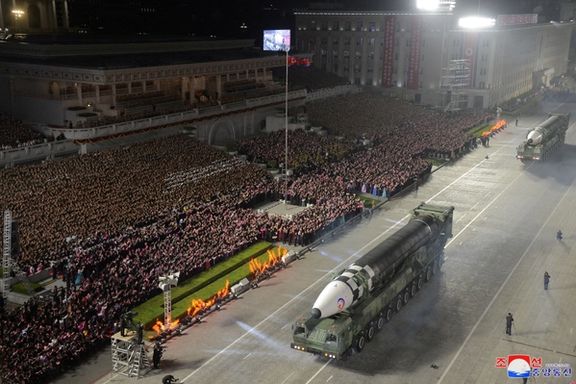
"We have to deploy every effort to prevent this problem, this current debate on what is happening and what can be done in Iran [from] becoming a failure on the part of the international community to prevent a country that has capabilities which could potentially lead to the development of nuclear weapons from doing it," he noted.
In September, Iran revoked the designation of several inspectors responsible for verification activities under the Non-Proliferation Treaty Safeguards Agreement. Grossi strongly condemned Iran's "disproportionate and unprecedented unilateral" decision, acknowledging it as a step in the wrong direction and an unnecessary strain on the relationship between the IAEA and Iran in the implementation of the NPT Safeguards Agreement.
Grossi's recent quarterly reports on Iran revealed that the Islamic Republic has now enriched enough uranium to approximately 60% purity, for several nuclear warheads. That stockpile can be further enriched to the roughly 90% required for weapons-grade material in a matter of a few weeks, making Iran a 'nuclear threshold state..
The agency is currently facing various standoffs with Iran, including disputes over identifying the origin of uranium particles found at two undeclared sites, the reinstallation of monitoring equipment that has been removed, and Iran's recent "de-designation" of IAEA inspectors.
Iran is has expanded its program significantly since 2018 when the United States unilaterally withdrew from the Iran nuclear deal – or Joint Comprehensive Plan of Action (JCPOA). Last month, three signatories of the deal, UK, France, Germany (E3) delivered a joint statement at the IAEA Board of Governors meeting in which they condemned Iran’s lack of transparency with regards to its nuclear program.
However, despite their emphasis on Iran’s non-compliance, the E3, much like the US, fell short of introducing measures that would ensure Tehran’s cooperation with the IAEA. On the contrary, just in August, the Biden administration agreed to release $6 billion of Iran’s funds blocked in South Korea due to US sanctions in exchange for five US citizens held hostage in Tehran.
In January, IAEA inspectors at Fordow detected undeclared centrifuge configuration changes as well as particles of uranium enriched up to 83.7%. When Grossi visited in March, he brought back an agreement that was hailed as a breakthrough by both sides but deemed insufficient and non-binding by its critics.
Seven months on, the premise seems to have been shaky at best. According to the IAEA, Iran has accumulated enriched uranium (5-60%) far beyond JCPOA limits that was hailed as a breakthrough by both sides but deemed insufficient and non-binding by its critics. Iran continues enrichment in Fordow, where inspectors detected undeclared particles of uranium enriched at 83.7%.